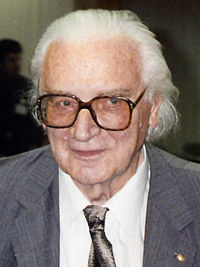Konrad Zuse Scientist
Konrad Zuse (German: [ˈkɔnʁat ˈtsuːzə]; 22 June 1910 – 18 December 1995) was a German civil engineer, inventor and computer pioneer. His greatest achievement was the world's first programmable computer; the functional program-controlled Turing-complete Z3 became operational in May 1941. Thanks to this machine and its predecessors, Zuse has often been regarded as the inventor of the modern computer.Zuse was also noted for the S2 computing machine, considered the first process-controlled computer. He founded one of the earliest computer businesses in 1941, producing the Z4, which became the world's first commercial computer. From 1943 to 1945 he designed the first high-level programming language, Plankalkül. In 1969, Zuse suggested the concept of a computation-based universe in his book Rechnender Raum (Calculating Space).Much of his early work was financed by his family and commerce, but after 1939 he was given resources by the Nazi German government. Due to World War II, Zuse's work went largely unnoticed in the United Kingdom and the United States. Possibly his first documented influence on a US company was IBM's option on his patents in 1946.There is a replica of the Z3, as well as the original Z4, in the Deutsches Museum in Munich. The Deutsches Technikmuseum in Berlin has an exhibition devoted to Zuse, displaying twelve of his machines, including a replica of the Z1 and several of Zuse's paintings.
Search
Scientist
| awards | |
|---|---|
| Field of study |
Topical connections
Konrad Zuse on Wikipedia
External resources
- ftp://ftp.idsia.ch/pub/juergen/zuse67scan.pdf
- ftp://ftp.idsia.ch/pub/juergen/zuserechnenderraum.pdf
- http://ei.cs.vt.edu/~history/Zuse.html
- http://irb.cs.tu-berlin.de/~zuse/Konrad_Zuse/en/index.html
- http://www-history.mcs.st-andrews.ac.uk/history/Mathematicians/Zuse.html
- http://www.dtmb.de/Aktuelles/Sonderausstellungen/Zuse_Ausstellung/index.html
- http://www.epemag.com/zuse
- http://www.fu-berlin.de
- http://www.idsia.ch/~juergen/digitalphysics.html
- http://www.idsia.ch/~juergen/zuse.html
